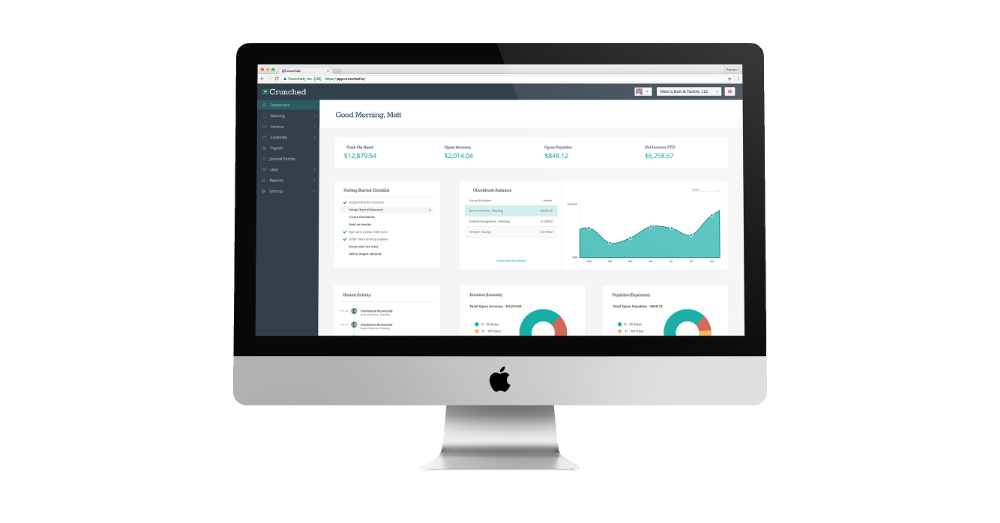Essential Technologies for Small Business Success
By Matt Reims
With technology advancing at a rapid pace, and more useful tools and software being introduced all the time, this is a great time to be operating a small business. Small business technology can help reduce workloads and automate processes so that business owners, bookkeepers, office managers, and operations managers can get more done in a more organized and efficient manner. For example, cloud accounting software can help you manage your finances, online platforms can help you automate social media postings, and the list goes on.
With so many useful tools, now is a great time to look into how you can incorporate technology into your operations. The technologies listed here can not only help with efficiency and organization, but also they can lead to increased profits. Small business technology can free you up to focus on tasks that you prefer doing. Here are six technologies that are worth a closer look.
CRM Software
Customer relationship management (CRM) software helps keep track of customer data and interactions, aids small businesses in managing their sales leads, and much more. Rather than entering customer contact information into a spreadsheet or holding on to a pile of business cards, invest in a CRM solution. Robust CRM’s will help keep information organized, help with scheduling appointments, and even help improve customer service. It’s often less expensive to retain a customer than to chase down a new one, so anything that can assist in keeping your current client base happy is worth the investment.
Salesforce is one of the largest CRM solutions and is more often used by businesses that have sophisticated integrated sales, marketing, and operational frameworks in place. This is an incredibly robust tool. Salesforce is also customizable — you can add functionality such as linking your database to email platforms. Licenses are expensive and can be cost-prohibitive for businesses of a certain size; however, Salesforce has recently rolled out a small business edition that is less costly.
Business News Daily recommends Salesforce overall. For very small businesses, it recommends Insightly; for a free option, it touts Zoho CRM. Its recommendations are based on CRM user feedback, online reviews and comments, and staff testing of the platforms, among other criteria.
Social Media Automation
Social media has become an essential marketing tool for small businesses. It can be an excellent way to stay in front of your target audience with engaging, entertaining, and useful information. Today, it’s recommended that small businesses post to certain social sites multiple times per day. Managing this type of process can be awkward and time-consuming if you’re stopping to research, design, write, and post at different intervals throughout the day and week. If you have a schedule that calls for evening, early morning, and/or weekend posts, you’ll need some help.
There are a variety of online platforms that can help you automate the process. Hootsuite, for example, can help you manage all of your social media work from one dashboard. Hootsuite has tools to not only manage your social media profiles but also find and schedule content automatically. Hootsuite can also find social influencers in your market and automate social marketing strategies for you.
Cloud Accounting Software
Your company’s success rests on your finances, which is why it’s so important that your books are managed properly. Oversights or miscalculations could lead to a loss of funds, tax penalties, or worse. Many small business owners are not experienced in financial matters and would prefer to focus on other tasks. Even seasoned bookkeepers and office managers find cloud-based accounting software to be useful for not only helping to avoid errors but also making the entire process of small business accounting much easier, faster, and more accurate. Also, because the software exists on the cloud, users can access their books from any device, which makes managing the process that much easier.
At Crunched, we’ve developed our cloud accounting software to be ultra secure, easy to use, and easy to access. We’ve equipped it with intelligent tools that help provide accurate financial results. Many existing online accounting platforms are cumbersome and difficult to navigate. Some offer confusing, enterprise-level features that are not relevant to small businesses. At Crunched, we developed an interface that is simple to navigate and useful specifically to small businesses. Our solution allows you to manage your checkbook, invoices, expenses, reporting, and more, all with ease. We use bank-level encryption, auto backups, and data redundancy to keep financial data safe so that your customer information is always secure.
Mobile Websites
As more and more people research businesses and topics, search for products and services, make purchases, and share business information via their smartphones, it’s crucial that your small business website has a mobile-friendly version. If people visit your site on their mobile device and can’t navigate it easily, it’s likely they will move on.
Having a mobile-friendly website is also important for search engine optimization (SEO). Google deems websites that are mobile friendly to be more useful to viewers. As a result, it bumps up mobile-friendly site content in organic search results. You can make your site mobile friendly by creating a responsive (as opposed to a static) website. Responsive websites are mobile friendly because they automatically adjust the layout of the site to fit a tablet or mobile screen. If you need help with making your site mobile friendly, check out Squarespace. They offer plenty of responsive templates that will help you get your site set up quickly and mobile friendly.
Project Management Software
Small businesses are always managing multiple projects at the same time. Apps like Evernote and online tools like Trello and Slack can help you and your team monitor the progress of ongoing tasks, view employees’ workloads, create and track production schedules, house project budgets, and store documents. These project management tools make communicating easier; all correspondence over the course of a project is kept in one place online rather than you having to sift through numerous email chains for information about that project.
Off-Site Storage
Creating a plan to backup your data is one of the most critical things you can do for your small business. The last thing you want is for sensitive information to get into the wrong hands — especially your customers’ information. Several off-site storage providers do an excellent job of meeting the technology needs of a small business. Off-site data backups are automated, which means you don’t have to ask someone to pull away from what they’re doing to do the backup manually. It’s also efficient: Files are backed up every day, so you’ll be able to recover the most recent data sooner and not have to worry about losing significant information.
Google Drive is a great place to start. They offer 15GB of free online storage so you can keep documents, spreadsheets, photos, anything safe and backed up. Being 100% cloud based, this means wherever you go, the drive will be there with you. You can access your drive from any smartphone, tablet or computer. With Google Drive being extremely secure and reliable, it's definitely a great option.
Running a small business will likely never be described as easy, but there are definitely ways to make it easier. When you invest in small business technologies like cloud accounting software to keep your finances in order, or a CRM platform to help you manage the sales process, you’ll be amazed by how much more time you have to focus on what you enjoy.


